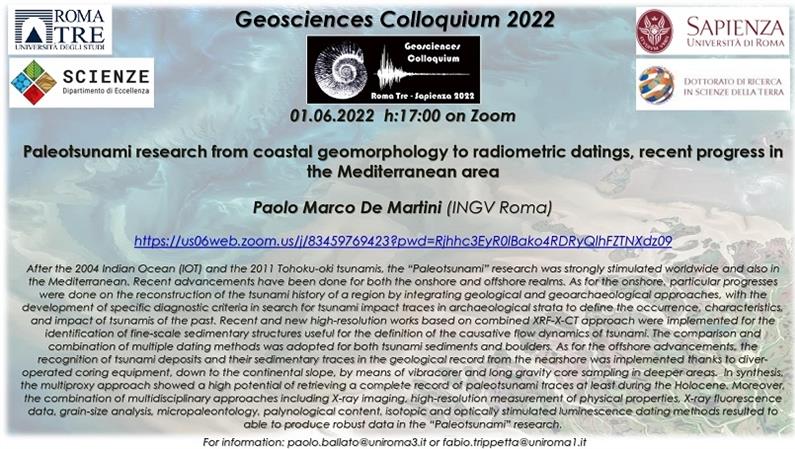Wednesday 01.06.2022 h.17:00 on Link identifier #identifier__13619-1Zoom
The speaker will be Paolo Marco De Martini (INGV Roma)
and the Colloquium will be titled:
Paleotsunami research from coastal geomorphology to radiometric datings, recent progress in the Mediterranean area
Abstract
After the 2004 Indian Ocean (IOT) and the 2011 Tohoku-oki tsunamis, the “Paleotsunami” research was strongly stimulated worldwide and also in the Mediterranean. Recent advancements have been done for both the onshore and offshore realms. As for the onshore, particular progresses were done on the reconstruction of the tsunami history of a region by integrating geological and geoarchaeological approaches, with the development of specific diagnostic criteria in search for tsunami impact traces in archaeological strata to define the occurrence, characteristics, and impact of tsunamis of the past.
Recent and new high-resolution works based on combined XRF-X-CT approach were implemented for the identification of fine-scale sedimentary structures useful for the definition of the causative flow dynamics of tsunami. The comparison and combination of multiple dating methods was adopted for both tsunami sediments and boulders. As for the offshore advancements, the recognition of tsunami deposits and their sedimentary traces in the geological record from the nearshore was implemented thanks to diver-operated coring equipment, down to the continental slope, by means of vibracorer and long gravity core sampling in deeper areas.
In synthesis, the multiproxy approach showed a high potential of retrieving a complete record of paleotsunami traces at least during the Holocene. Moreover, the combination of multidisciplinary approaches including X-ray imaging, high-resolution measurement of physical properties, X-ray fluorescence data, grain-size analysis, micropaleontology, palynological content, isotopic and optically stimulated luminescence dating methods resulted to able to produce robust data in the “Paleotsunami” research.
Link identifier #identifier__181282-2Locandina
Seminar: Paleotsunami research from coastal geomorphology to radiometric datings, recent progress in the Mediterranean area - Dipartimento di Economia
 Dipartimento di Economia
Dipartimento di EconomiaDipartimento di Economia dell'Università degli Studi Roma Tre
Department of Economics

Dipartimento di Economia dell'Università degli Studi Roma Tre
